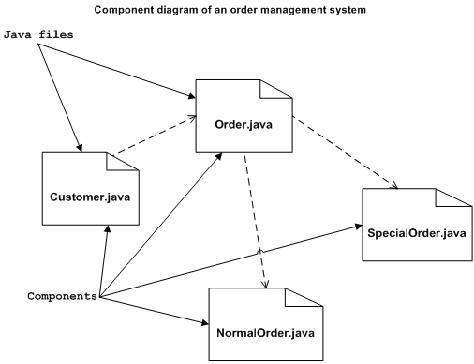Component diagrams are used to visualize the organization and relationships among components in a system. These diagrams are also used to make executable systems.
Purpose of Component Diagrams
Component diagram is a special kind of diagram in UML. The purpose is also different from all other diagrams discussed so far. It does not describe the functionality of the system but it describes the components used to make those functionalities.Thus from that point of view, component diagrams are used to visualize the physical components in a system. These components are libraries, packages, files, etc.
Component diagrams can also be described as a static implementation view of a system. Static implementation represents the organization of the components at a particular moment.
A single component diagram cannot represent the entire system but a collection of diagrams is used to represent the whole.
The purpose of the component diagram can be summarized as −
- Visualize the components of a system.
- Construct executables by using forward and reverse engineering.
- Describe the organization and relationships of the components.
How to Draw a Component Diagram?
Component diagrams are used to describe the physical artifacts of a system. This artifact includes files, executables, libraries, etcThe purpose of this diagram is different. Component diagrams are used during the implementation phase of an application. However, it is prepared well in advance to visualize the implementation details.
Initially, the system is designed using different UML diagrams and then when the artifacts are ready, component diagrams are used to get an idea of the implementation.
This diagram is very important as without it the application cannot be implemented efficiently. A well-prepared component diagram is also important for other aspects such as application performance, maintenance, etc.
Before drawing a component diagram, the following artifacts are to be identified clearly −
- Files used in the system.
- Libraries and other artifacts relevant to the application.
- Relationships among the artifacts.
- Use a meaningful name to identify the component for which the diagram is to be drawn.
- Prepare a mental layout before producing the using tools.
- Use notes for clarifying important points.
In the following diagram, four files are identified and their relationships are produced. Component diagram cannot be matched directly with other UML diagrams discussed so far as it is drawn for completely different purpose.
The following component diagram has been drawn considering all the points mentioned above.

Where to Use Component Diagrams?
We have already described that component diagrams are used to visualize the static implementation view of a system. Component diagrams are special type of UML diagrams used for different purposes.These diagrams show the physical components of a system. To clarify it, we can say that component diagrams describe the organization of the components in a system.
Organization can be further described as the location of the components in a system. These components are organized in a special way to meet the system requirements.
As we have already discussed, those components are libraries, files, executables, etc. Before implementing the application, these components are to be organized. This component organization is also designed separately as a part of project execution.
Component diagrams are very important from implementation perspective. Thus, the implementation team of an application should have a proper knowledge of the component details
Component diagrams can be used to −
- Model the components of a system.
- Model the database schema.
- Model the executables of an application.
- Model the system's source code.
댓글 없음:
댓글 쓰기